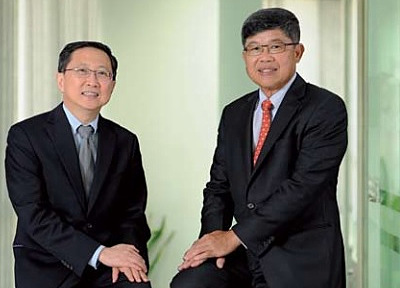Excerpts from UOB Kay Hian's report
|
|
WHAT’S NEW
» We hosted a teleconference for investors with Silverlake’s (SILV) management to discuss the group’s outlook and prospects. This note highlights our key takeaways.
STOCK IMPACT
» Why did the IPTs arise? As of FY14, revenue from new Interested Person Transactions (IPT) mandates and ancillary transactions of RM120.5m represented 24% of full-year revenue. Management guided that the IPTs arose due to the following: a) SILV’s chairman, Mr Goh Peng Ooi, has private entities which provide IT modules and services that SILV may not want to specialise in. For example, instead of buying and developing SILV’s capabilities to serve the stockbroking business, the group uses products and services from the private entities of Mr Goh, b) Mr Goh’s private entities are resellers of SILV’s software. An example would be the Middle East and North Africa (MENA) markets where SILV has no intention on building a marketing team to venture into. However, Mr Goh’s private entities would conduct business in those markets, and c) Mr Goh’s private entities purchase SILV’s software for long-term R&D related activities or for testing of new concepts where SILV might not be interested to be part of.
» Growth concerns. Although lacking new major orderbook announcements, we understand SILV is getting new mid-sized software project service upgrades from existing clients, which will continue to feed into 4-5 quarters of rolling backlogs (RM250m).
Management guided that even without any major orderbook wins, the group’s maintenance and enhancement services are expected to grow by 30% in the near term, driven by GST contracts and digital banking initiatives such as crowd funding and peer-topeer lending activities. In addition, software licensing and project services are expected to see mid-teens growth. For the medium to long term, we think SILV’s strategic acquisitions, such as GIT and Finzsoft, offer opportunities to cross sell and further expand into China, Australia and New Zealand.
STOCK IMPACT
» Worst-case scenario analysis. We look at the possible worst-case outcome for our FY16 estimates, assuming either zero growth in revenue or reversion of gross margins towards peers’ average* of 46.3% (SILV’s FY14 gross margin was 61.3%). Despite assuming the worst-case scenarios, we note SILV’s ROE is still higher than peers’ average of 24.9%.
» Share buybacks are expected to provide price floor support. Post the latest round of 1.1m share buybacks on 4 Jun 15, SILV has bought 62.1m shares since commencing its daily share buy-back mandate. We note that with the maximum 224m shares authorised for buy-back and a net cash balance of RM327m as at Mar 15, there is additional scope and capacity for buybacks should there be further weakness to share price. In addition, SILV’s CEO, Dr Raymond Kwong, has also bought 200,000 shares on 9 June. We understand he has not divested any SILV shares since his acquisition.
» Comparison of key valuation metrics pre and post sell-down. SILV’s share price has declined 26% from a high of S$1.47, implying a market capitalisation loss of about S$864m. At pre-sell-down price of S$1.47, SILV was trading at 25.8x FY16F PE vs the current 20.3x at S$1.09.
» Fundamentals remain intact. SILV’s business model remains unchanged, deriving more than 40% of revenue from its solid recurring segment (maintenance and enhancement services). As of 9MFY15, the group achieved operating margin of 66.6%, higher than peers’ average of 46.3%. Essentially, the group continues to generate cash and pays out consistent dividends. We estimate an operating cash flow of RM325m in FY16.
EARNINGS REVISION/RISK
» None.
VALUATION/RECOMMENDATION
» Maintain BUY and DCF-based target price of S$1.66. SLV remains on our BUY list for its superior business model (with high recurring earnings) and strong cash flows. Looking from a longer-term perspective, we think SILV was oversold and this presents investors with a solid buying opportunity.
SHARE PRICE CATALYST
» Positive catalysts include: a) new contract wins, b) share buy-backs, and c) accretive new investments or M&A.
Full report here.




